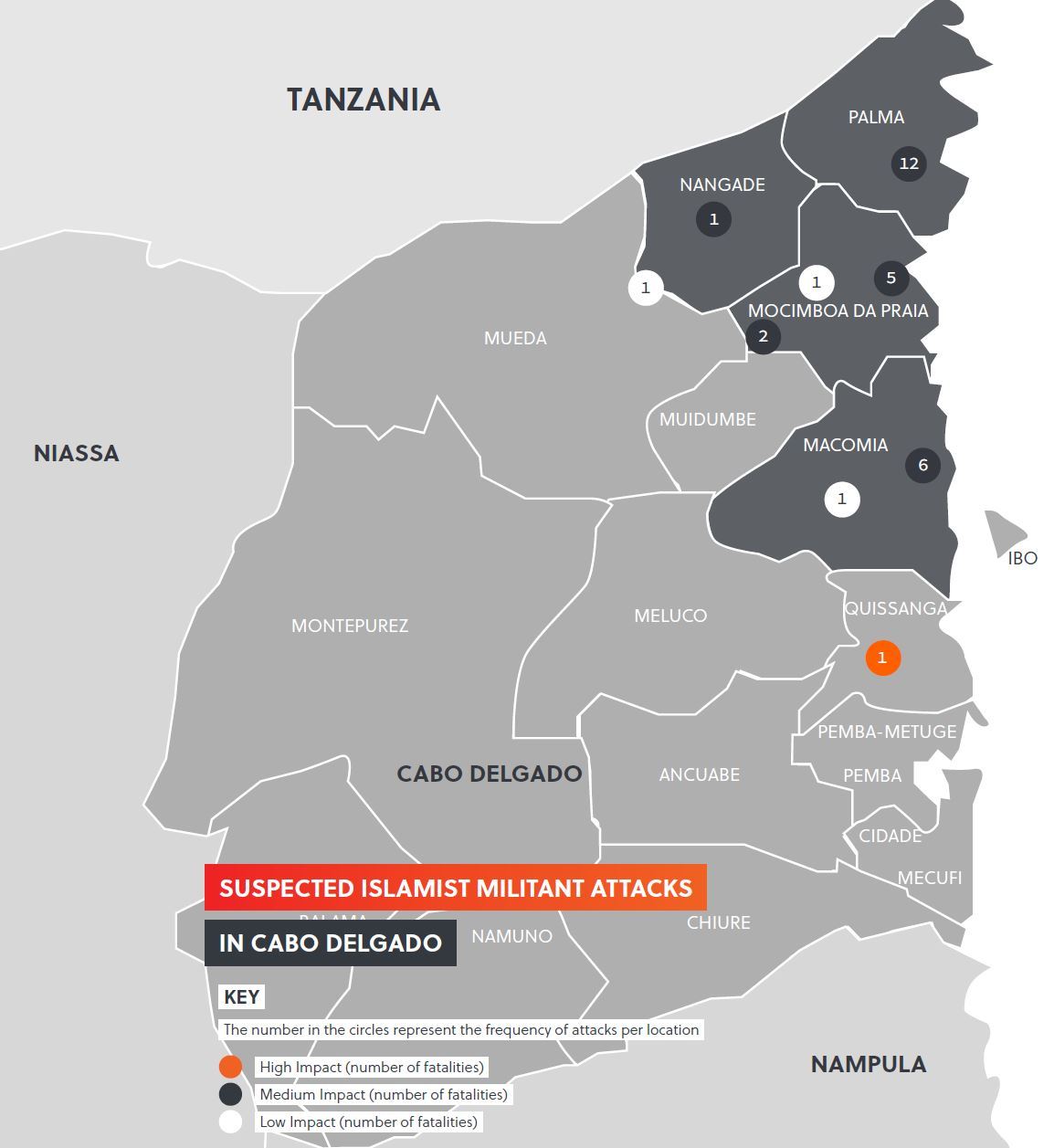The New Face of Militancy in Mozambique
Mozambique’s previously overlooked province of Cabo Delgado is set to become the centre of the country’s oil and gas industry, following the discovery of significant offshore liquefied natural gas in the Rovuma Basin in recent years. Yet, the recent emergence of an apparent Islamist insurgency in the region has raised significant security concerns, and dampened investor confidence in the province. The first such attacks were reported in Cabo Delgado in October 2017, but since the start of June this year attacks have ramped up in both frequency and levels of violence, with targeting patterns shifting from security forces to civilians. Now, with Mozambique entering an election year, and the government eager to win the support of foreign investors, the emerging crisis could jeopardise oil and gas ambitions in the country.
The Cabo Delgado attacks have been attributed to a radical Islamist sect known as ‘Ahlu Sunnah Wa Jamâ’, otherwise known as ‘Al Sunnah’. Local communities have also referred to the group as ‘Al Shabaab’ or ‘The Youth’. However, Al Sunnah has no ties to the Somalia-based group of the same nameinsteadand this reference rather points to the make-up of the group, which largely comprises young, disenfranchised males from Mwani communities, the primarily Muslim local ethnic group. Al Sunnah first emerged in Mozambique in 2012 seeking to promote and expand Islamic practices and social institutions in the region, but only adopted a militant agenda several years later. The first recorded attack linked to the group took place in October 2017, when at least 30 gunmen launched a coordinated attack on three security posts in the coastal town of Moćimboa da Praia, 70km south of the Tanzania border. Two police officers and 14 assailants were killed in the incident. Since then, there have over 30 attacks against villages in the Mocímboa da Praia, Macomia, Palma, and Nangade districts in Cabo Delgado, in which at least 34 people have been killed, including in beheadings, and 100 homes razed.

Despite adopting an Islamist agenda, which likely has resonance with certain marginalised youths, the overarching goals of Al Sunnah remain largely obscure. While Al Sunnah draws on Islamist extremism, and the leadership appears to have ties to international jihadi groups, the latest attacks suggest a local variant of Islamist militancy instead, involving attacks by local cells directed by local leaders. Furthermore, although Al Sunnah rhetoric largely targets the Mozambican government, and any entity identified as ‘opposing’ the group, attacks have specifically targeted community leadership.
Some commentators point to the inherent vulnerability to extremism among certain sectors of Cabo Delgado society as the reason for the latest violence. Cabo Delgado has indeed suffered from political and economic marginalisation since the end of the civil war in 1992. The predominantly Muslim community, which comprises 58 percent of the province’s population, but only 18 percent of the larger national population, have long pointed to their isolation from Maputo. A perceived lack of opportunity have made the youth, in particular, increasingly vulnerable to radicalisation by extremist groups, such as Al Sunnah.
While Al Sunnah draws on Islamist extremism, and the leadership appears to have ties to international jihadi groups, the latest attacks suggest a local variant of Islamist militancy instead, involving attacks by local cells directed by local leaders.
Other commentators have claimed that political opposition groups seeking support against the dominance of the ruling Frente de Libertação de Moçambique (Frelimo) government have previously capitalised on the marginalisation of Cabo Delgado’s Muslim communities for their own political agendas. Main opposition player, and former rebel group, Resistência Nacional Moçambicana (Renamo), for example, has previously sought support among communities in the region. Renamo has also engaged in more aggressive tactics to secure political goals. With elections scheduled for October next year, some allege that it is a convenient time to build a joint platform to voice socio-economic grievances while simultaneously making use of aggressive tactics. This instability will likely hold significant wealth prospects in the oil sector to ransom, provided Renamo can keep its supporters on board.
To this end, the Mozambican government will be eager to step up military operations against the group. Yet, short term gains in bringing the perception of stability to the region in the hopes of securing financial gains, could have some long-term consequences for Cabo Delgado. The Mozambican government has previously employed blanket arrests targeting communities accused of harboring militant threats in its campaign against Renamo supporters and it seems eager to follow similar tactics this time around. Already some 470 people have been detained due to their alleged connection to the Cabo Delgado attacks and security operations are expected to be ramped up in the coming weeks. Consequent reprisal attacks, coupled with aggravated tensions in communities likely to be profiled in mass arrests, will increase anti-government sentiment in the region. Although short term military gains against Al Sunnah may appease investors, they will do little in addressing causes rooted in socio-economic marginlisation and political exclusion. In this regard, this latest insurgency in Mozambique is likely to transform into a significant security threat in the region, one that will no doubt undermine commercial prospects in Cabo Delgado.
